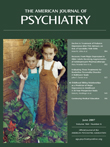Depression in late life is a growing public health problem that, unfortunately, remains poorly understood and often improperly treated. In this issue, Dew and colleagues present a treatment trial involving older adults that offers some clues regarding treatment outcomes among elderly patients, many of whom required augmentation after initial pharmacotherapy for depression. From this study, clinicians may glean insights about the type of patients receiving augmentation and the success of this treatment approach.
Dew et al. describe 195 participants age 70 or older who were treated openly at the University of Pittsburgh Late Life Mood Disorders Outpatient Treatment Clinic with paroxetine and interpersonal psychotherapy. Half of the patients responded to this initial treatment. The patients who did not achieve sustained recovery were offered an augmentation trial involving bupropion, nortriptyline, or lithium, selected on the basis of the clinical judgment of the expert team. Of the patients who were eligible for augmentation, two-thirds received it and one-third did not. Among those who did not proceed with augmentation, in many cases the decision was made because of concerns about medical comorbidity that made additional drug treatment unwise.
The patients who required augmentation recovered more slowly and had modestly more side effects. In this group, the presence of anxiety symptoms as well as a high general medical burden predicted slower treatment response. These two prognosticators were remarkably common in the overall group, i.e., 67.0% reported significant anxiety symptoms on the Brief Symptom Inventory anxiety subscale and 43.6% had a high general medical burden as measured by the Cumulative Illness Rating Scale. Another notable feature of the overall group was the observation that 32.3% had significant cognitive impairment, according to the scaled Mattis Dementia Rating Scale score.
The analysis examined the differences among the older patients who went on to receive augmentation compared to those who were eligible in terms of depressive symptoms but who did not proceed to augmentation for other reasons. The authors aptly discuss the considerable problem of medical comorbidity: despite their best attempts to tailor their augmentation strategies to accommodate medical conditions, over one-third of their augmentation-eligible subjects were “either unwilling to accept augmentation or had medical conditions that precluded continuation in the study.” This is a striking reflection of how much our hands are tied in the care of this population. Yet, remarkably, this study does show response rates that are as good as or better than the response rates observed in studies of younger adults. Among those who did receive the augmentation phase, 50.0% of those who initially had an inadequate response went on to recover, and 66.7% who had initially relapsed also achieved recovery. These rates compare very favorably to those in the augmentation phase of the STAR*D trial. In the initial STAR*D augmentation phase involving bupropion after a failed response to citalopram
(1), there was a 29.7% rate of remission, defined by using a cutoff score on the 17-item Depression Hamilton Rating Scale. The better response rates observed in the Dew study appear to defy the typical perception that older adults will fare worse with such treatment strategies (although there were some differences in recovery criteria, as the remission rate in the STAR*D trial was based on a Hamilton scale score of ≤7, while Dew and colleagues defined full recovery at ≤10 and partial recovery at ≤14 on the 17-item Hamilton scale).
Therefore, despite the prospect of successful treatment, augmentation efforts may be curtailed because of medical comorbidity. Unfortunately, medical comorbidity, often the cause for exclusion in studies of younger patients, is a hallmark of depression in the elderly. Among the common medical conditions, depression in the context of vascular disease has already been identified to have unique features and course, leading to the term “vascular depression,” associated with frontal-executive dysfunction involving apathy, psychomotor retardation, and slowed information processing
(2,
3) . In recent years this area has evolved to reflect specific underlying mechanisms of disease, e.g., subcortical ischemic depression, suggested by Taylor et al. as a subtype within the broader construct of the depression–executive dysfunction syndrome
(4) .
In the Dew study, among the 32.3% in the overall group with clinically significant cognitive impairment, there was most likely a subset with vascular-related sources of cognitive change, which may have comprised a distinct subgroup. Depending on the underlying mechanism afoot, there may have been differential cognitive improvements with recovery from the depressive episode, although posttreatment cognitive data were not presented. A mechanistic approach to understanding late-life depression may help us better characterize the sources of variance in outcomes as well as help us develop strategies to treat patients who are not eligible for conventional augmentation methods because of a high medical burden. Of course, one must be careful not to view age-related brain changes as necessarily pathoetiologic, as there is always a danger of mapping multiple collinear markers that may bring us no closer to effective treatments. This is simply the challenge of research in aging, and we owe it to our graying population to embrace this complexity and get to work sorting it out.

